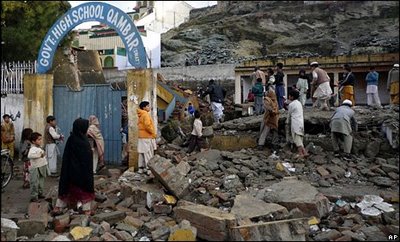By Dr Shahid Masood
WASHINGTON: Americans see a change fast, but smoothly, coming in Pakistan in the wake of loss of credibility of the man at the helm, following some domestic legal developments.
After meeting top political and defence decision-makers here in the US capital, where I was invited by the National Defence University (NDU) for a two-day seminar on the anniversary of 9/11, I was told in unambiguous terms that a change in Pakistan was inevitable for US policy interests, although Washington does not intend to disrupt the system.
Several important Pakistani political players have also been conveyed the same message by the US political and defence establishment, including the MQM and recently the ANP, whose chief is travelling with President Asif Zardari in New York.
The main problem being faced by the US administration, which it may never admit publicly, is that the present set-up with Asif Ali Zardari as the de facto ruler, has no credibility at home and no ability to deliver on the promises he makes, either on the military side or on the war on terror or on governance issues.
“Zardari has also abandoned the idea of political consensus which he had started to follow in the early days after the February elections,†one official said on background. “He appears to be non-serious in government and lives in perpetual fear and insecurity, preferring to stay out of the country.â€
The US side thinks that they had made a sensible move by pushing an alliance between late Benazir Bhutto and General Pervez Musharraf as this team would have provided all the ingredients of a stable and cooperative Pakistan to Washington. She would have provided the political support while Musharraf would have used his military muscle against the terrorists and extremists in a stable environment.
They say Zardari has failed to provide that environment, rather he has involved himself in day-to-day business and administrative matters while his political coalition and parliament have been left looking like dumb and dummies.
Many officials say Zardari has been asking the US administration to bail him out on too many issues and too many occasions. He has sought the US help to tame the Army, keep his alliance partners, especially the opposition of Nawaz Sharif’s PML-N in check, directly or through the Saudis on sensitive issues like Musharraf’s or cutting his own constitutional powers.
All these demands are way beyond the capacity of any US administration to deliver while Zardari has almost left everything to us to handle, an agitated official said. “If we have to handle everything, his own credibility within the country will sink and has sunk to the lowest low.â€
Other officials I met were even blunter. They say the US abhors corruption, kickbacks and commissions anywhere in the world as a matter of policy.
Another official said the US would keep track of the parties or persons involved and money transaction in the Pakistan’s rental power venture. There are still no roadmaps or any modality work sheets in Washington on how a change in Pakistan would occur, but the US capital is keeping its fingers crossed as to what comes out of the NRO case pending with the Supreme Court.
The impression gathered from the words of these top Americans is that the US would not intervene if the apex court starts hearing the case. The view is that if the NRO was discussed and details of who benefited, who made what deals and how serious crimes were committed and then whitewashed, start to be revealed in the SC, the moral authority of the NRO beneficiaries would erode fatally. In this scenario, the NRO beneficiaries may themselves throw in the towel seeking a safe exit.
In several informed US and Pakistani circles I moved in for several days in Washington, the same scenario was repeated, often exactly in the same tone and sequence.
A Pakistani, who knows a lot about developments in Pakistan and the US scene, said that apart from this purely legal and domestic scene, there were four possible ways through which Zardari could exit. These ways were repeated by others who had nothing to do at all with the previous source. They are: one, impeachment; two, voluntary resignation in the wake loss of credibility; three, ‘natural’ or man-made elimination of the president, and, four, an Army coup. The impeachment and coup scenarios are considered non-starter and impossibility.
US and some Pakistani circles said that a resignation after enough dirt is thrown in the public domain when the NRO case details begin to unfold is a favourite way out, as it would not, being an outcome of the legal process, disrupt the system.
I was asked many times whether a coup is a possibility in the current situation and I always said no, but the question kept surfacing again and again.
This is probably because there was some loose talk of a shuffle in the military hierarchy by President Zardari in which Army chief General Kayani was to be replaced by some other pliant general who could ensure continuity and stability for the Zardari regime.
This scenario was shot down in Washington instantly as an impossibility, since it had information that the Pakistan Army considered a coup or intervention as a total no-go area and could have brought back another October 12, 1999 type of situation. It is so also because of the fact that Gen Kayani has established, through words and deeds, that he is all for democracy.
With all these scenarios being discussed, the growing feeling is that not much time is left for the current status quo and it will lead to a period of political turmoil in Pakistan if President Zardari continues with his ways any longer.
The sudden emergence of a top MQM delegation in Washington for talks with the policy makers, officials and think tanks of Washington has also raised many questions as the official Pakistani diplomatic channels were totally cut off and I gather that this was done at the insistence of the US side more than the MQM leadership.
Not even a courtesy meeting between Governor Ishratul Ebad and Ambassador Husain Haqqani was held until four days after the arrival of the MQM delegation and meetings with top strategists, including Bruce Riedel, John Negroponte, Richard Boucher, and current State Department officials, including Richard Holbrooke.
A similar exercise has now been planned with the ANP chief while he will be here in the presidential entourage.
What happened in these meetings is known only to the MQM leaders and the US side but the tone and tenor of MQM in the coming weeks and days will give the first hints of whether the course of the PPP-MQM alliance is changing in stormy waters in the middle of the sea. How the ANP reacts is also to be seen but already Asfandyar Wali is said to be very happy with the praise for his party’s governance in the NWFP by US officials as well as the promises to give them direct financial aid. With the MQM and the ANP almost on board, I will be eagerly waiting for the first signs of the new US strategy unfolding in the days and weeks to come.
{Source: The News}










